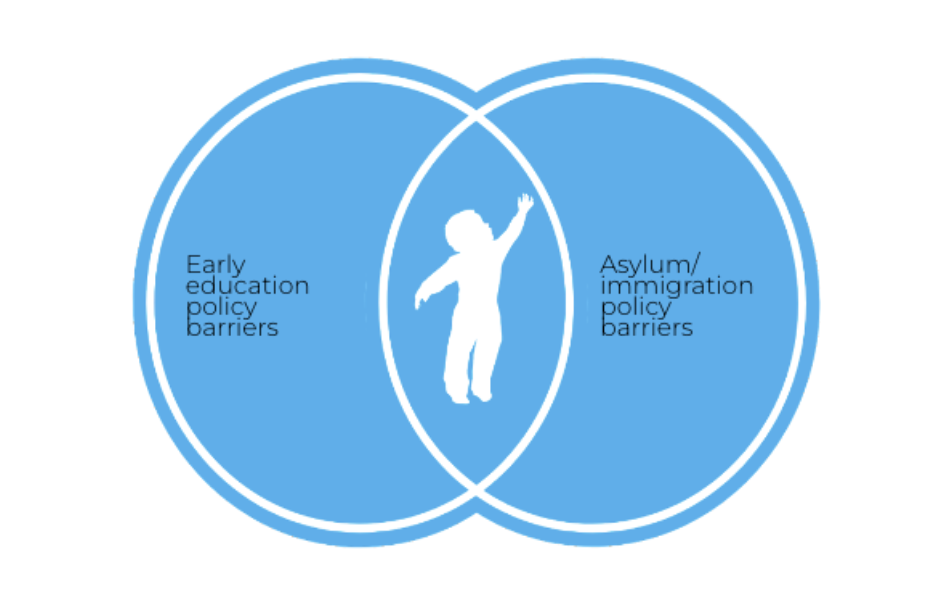Refugee Education UK works to equip young refugees (including those still seeking asylum) to build positive futures by thriving in education. We operate several programmes which facilitate access to education for young refugees, improve their educational outcomes and ensure that they benefit from their investment in education. Our research is conducted in partnership with young people, and we use the findings to bring about change in our own programmes and to positively influence refugee education policy and practice in the UK and around the world.
At the Continuing Conversations showcase, we heard from one of REUK’s youth advocates on their experience in education in the UK, and the research team presented findings from four of our recent research projects:
- Out of Sight, Out of Mind
- STRIVE (Sustainable Transformative Inclusive Refugee Education)
- ASPIRE (A Sustainable Place for Inclusive Refugee Education)
- InSPPiRE (Inclusive and Sustainable Promising Practices in Refugee Education)
Brief summaries of the research with links to full reports can be found below.
1. My Education Journey in the UK
Khoshhal Popalzai, a student of Law at the University of Bristol, a youth advocate at REUK and an ambassador for the VOICES network with the British Red Cross in South West England, shared his personal account of accessing and experiencing the UK education system as an Afghan refugee.
These are some of the changes he hopes to see, to help improve access to education for refugee and asylum-seeking young people:
- Making financial aid for refugee and asylum-seeking students accessible
- Provision for asylum-seekers to access financial aid without requiring bank accounts
- Finding ways for previous degrees and documents from countries of origin to be recognised
- Education institutions prioritising a culture of welcome and belonging for newly arriving refugee and asylum-seeking students
2. Out of Sight, Out of Mind
Refugee Education UK and UNICEF UK collaborated to undertake research into the experiences of early childhood education and care (ECEC) for refugee and asylum-seeker families in England. Through listening to the experiences of parents of refugee children and practitioners in the refugee support and early education sectors, this research uncovers the vital importance of quality, contextual and trauma-informed early education for refugee and asylum-seeking babies and young children, and their families.
Yet the research also highlights a multitude of challenges that make accessing this vital early education difficult. The findings suggest that these challenges stem from the youngest refugee and asylum-seeking children being caught in the middle of two UK policy systems: the ECEC funding and asylum systems. Each overlooks their existence and de-prioritises their rights.
This research and its recommendations provide a clear roadmap to ensure refugee and asylum-seeking children are supported to develop in their early years, by putting the most marginalised children at the heart of policy-making.
Full report

3. STRIVE (Sustainable Transformative Inclusive Refugee Education)
The purpose of this paper is to inform structural policy changes at a national level that will improve outcomes for refugee and asylum-seeking children in secondary education in England. The recommendations presented are the result of focus group discussions with key stakeholders in the education sector (including teaching unions; Virtual School head teachers; CEOs of Multi Academy Trusts; staff from local authorities and third-sector organisations supporting refugees and asylum seekers with education-related outcomes).
This paper calls on policymakers to move beyond a crisis-based approach to refugee education and towards a sustainable and inclusive policy landscape to ensure every child seeking sanctuary in the UK is able to access and thrive in appropriate, high quality education.
Full report
4. ASPIRE (A Sustainable Place for Inclusive Refugee Education)
A Sustainable Place for Inclusive Refugee Education (ASPIRE) is a research initiative between the University of Nottingham (led by Professor Joanna McIntyre) and Refugee Education UK (REUK). This study focuses on refugee education and uses a participatory methodology led by learners with asylum-seeking and refugee backgrounds. ASPIRE is a place-based study that aims to understand existing education provisions in two English cities – Oxford and Nottingham – from the perspective of young refugees and those who support them in local communities.
This project aims to develop a holistic educational network for refugees. Thus, despite its focus on Nottingham and Oxford as specific research locations, its objective is to showcase effective local initiatives and facilitate the transfer of their knowledge to other localities.
The findings from the research, and a toolkit with learnings from the participatory approach, will be published in the Summer of 2024.
Full report (coming June 2024)
Blog from an Expert by Lived Experience
5. InSPPiRE (Inclusive and Sustainable Promising Practices in Refugee Education)
InSPPiRE is a learning project that seeks to identify and amplify promising practices from case studies of refugee education initiatives in high-income countries. The project incorporates learnings from 29 case studies of initiatives supporting refugee education across 12 high-income settings: Australia, England, Greece, Hong Kong, Italy, Lithuania, Netherlands, Northern Ireland, Scotland, Sweden, the United States of America and Wales.
The report is a synthesis of learnings from the 29 case studies that have been grouped under 4 broad themes:
- Access to quality education in the national education system
- Psychosocial wellbeing and inclusive practices
- Educator training and support
- Partnerships for sustainable outcomes
Based on the learnings, 11 promising practices in refugee education in high-income settings emerged, which are analysed in the report.